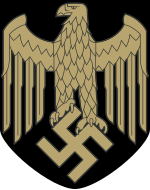Kriegsmarine
The Kriegsmarine (German pronunciation: [ˈkʁiːksmaˌʁiːnə], War Navy) was the Navy of Weimar Republic from 1919 to 1935 and Nazi Germany from 1935 to 1945. It replaced the Imperial German Navy of World War I and the inter-war Reichsmarine. The Kriegsmarine was one of three official branches of the Wehrmacht, the armed forces of Nazi Germany.

History
changeThe Kriegsmarine was developed during the German naval rearmament of the 1930s. The Treaty of Versailles had limited the size of the German navy after World War I. It also prevented Germany from building submarines.[1] But by 1934 Germany had secretly stockpiled most of the parts they needed to construct submarines (called U-boats).[1] In early 1935 Hitler ordered the U-boats to be built.[1] In January 1939 Plan Z was ordered, calling for the construction of many surface naval vessels. The ships of the Kriegsmarine fought during the Spanish Civil War and World War II. The commander of the Kriegsmarine was Karl Dönitz.[2]
Ships
changeThe Kriegsmarine's most famous ships were the U-boats. Most of them were built after Plan Z was abandoned at the beginning of World War II.[3] Wolfpacks were groups of submarines that attacked British convoys. Most of the attacks were during the first half of the Battle of the Atlantic. Along with the U-boats, commerce raiders and cruisers were used to disrupt Allied shipping in the early years of the war. The most famous of these were the heavy cruisers Admiral Graf Spee and Admiral Scheer and the battleship Bismarck. However, the allied adoption of convoy escorts greatly reduced the danger from commerce raiders.
References
change- ↑ 1.0 1.1 1.2 Gordon Williamson, Kriegsmarine U-boats 1939-45 (London: Osprey Publishing, 2014), p. 5
- ↑ Geirr H. Haarr, The Gathering Storm: The Naval War in Northern Europe September 1939-April 1940 (Barnsley: Seaforth Publishing, 2013), p. 28
- ↑ Bruce Watson, Atlantic Convoys and Nazi Raiders: The Deadly Voyage of HMS Jervis Bay (Westport, CT: Praeger Publishers, 2006), p. 127